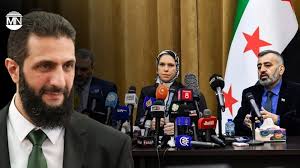The National Dialogue Conference, which kicks off today, Monday, has already drawn significant criticism from politicians and activists who argue that its agenda and execution fall short of the gravity of Syria’s political and humanitarian crisis. Critics point to last-minute invitations, poorly structured discussions, and a rushed timeline as indicators that the conference may be little more than a token gesture rather than a genuine effort to chart Syria’s future.
A Questionable Agenda and Unprepared Attendees
The conference agenda, set to begin with an introductory session and dinner on Monday before moving to discussions on Tuesday, raises doubts about the event’s seriousness. Discussions will be divided into six working groups covering transitional justice, constitutional reforms, institutional rebuilding, personal freedoms, civil society, and economic principles.
However, the last-minute nature of the invitations—sent less than 48 hours before the event—has left many invited figures unable to attend, particularly those based abroad. Several prominent invitees, including former opposition coalition member George Sabra, Syrian program director at the Atlantic Council Qutaiba Idlbi, political analyst Marah al-Buqai, constitutional law professor Sam Della, and former Syrian Foreign Ministry spokesman Jihad Maqdisi, declined to participate due to the impractical timeline and logistical hurdles.
“The way invitations were sent shows a lack of seriousness in handling such a crucial national issue,” said Sam Della, who was invited only on February 23—just two days before the conference—making it impossible for him to reach Damascus in time.
Disorganized Preparatory Sessions and Lack of Clear Direction
The preparatory sessions held across Syria in the past week have also been widely criticized. While intended to lay the groundwork for meaningful discussions, many descended into disarray due to an absence of structure and inconsistent adherence to the agenda. Reports indicate that some sessions lacked moderation, leading to chaotic discussions where certain issues were sidelined in favour of others.
Even the method of inviting participants has been questioned. According to a statement by the conference’s preparatory committee, invitations were sent out by volunteers rather than through an official process, further raising doubts about transparency and inclusivity.
A Dialogue in Name Only?
Despite the backlash, Hassan al-Dgheim, the conference spokesperson, insisted that the dialogue is a serious endeavour, claiming that its outcomes will inform future constitutional reforms, economic policies, and institutional restructuring. He highlighted the participation of over 4,000 individuals across 30 meetings nationwide, emphasizing the repeated demand for a temporary constitutional declaration to guide the transitional phase.
However, many remain unconvinced, arguing that the conference lacks credibility and is merely a political manoeuvre rather than an authentic attempt at national reconciliation. Human rights advocate and director of the Syrian Center for Justice and Accountability, Mohammad al-Abdallah, called the event a “farce,” describing the rushed invitations and lack of preparation as a “political cover” for the ruling authorities rather than a serious initiative.
“The way this dialogue has been organized suggests that it is merely an exercise in optics rather than a legitimate effort to build Syria’s future,” he said.
Lingering Questions and Unresolved Issues
Beyond procedural missteps, deeper political tensions and unresolved issues cloud the dialogue’s potential. Observers point out that key issues—such as Syria’s relations with Kurdish forces, the Druze community in Suwayda, and the Alawite minority, as well as the stance of hardline Islamist factions toward the new leadership under Ahmed al-Sharaa—remain largely unaddressed.
Al-Abdallah argues that the only way to salvage the dialogue is to broaden its scope, extend its timeline, and ensure its recommendations carry actual weight. Without this, he warns, Syria risks entering a prolonged transitional phase, delaying political recovery, eroding public trust, and missing an opportunity to establish a sustainable political framework.
For now, however, scepticism remains the dominant sentiment. Many view the National Dialogue Conference as an exercise in political theater, aimed more at appeasing international observers and consolidating power rather than fostering a genuine, inclusive path toward Syria’s future.
This article was translated and edited by The Syrian Observer. The Syrian Observer has not verified the content of this story. Responsibility for the information and views set out in this article lies entirely with the author.


